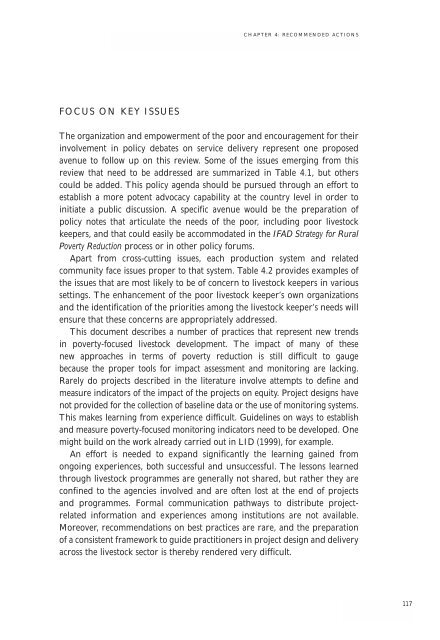Livestock Services and the Poor: A global initiative - IFAD
Livestock Services and the Poor: A global initiative - IFAD
Livestock Services and the Poor: A global initiative - IFAD
You also want an ePaper? Increase the reach of your titles
YUMPU automatically turns print PDFs into web optimized ePapers that Google loves.
Focus on Key Issues<br />
CHAPTER 4: RECOMMENDED ACTIONS<br />
The organization <strong>and</strong> empowerment of <strong>the</strong> poor <strong>and</strong> encouragement for <strong>the</strong>ir<br />
involvement in policy debates on service delivery represent one proposed<br />
avenue to follow up on this review. Some of <strong>the</strong> issues emerging from this<br />
review that need to be addressed are summarized in Table 4.1, but o<strong>the</strong>rs<br />
could be added. This policy agenda should be pursued through an effort to<br />
establish a more potent advocacy capability at <strong>the</strong> country level in order to<br />
initiate a public discussion. A specific avenue would be <strong>the</strong> preparation of<br />
policy notes that articulate <strong>the</strong> needs of <strong>the</strong> poor, including poor livestock<br />
keepers, <strong>and</strong> that could easily be accommodated in <strong>the</strong> <strong>IFAD</strong> Strategy for Rural<br />
Poverty Reduction process or in o<strong>the</strong>r policy forums.<br />
Apart from cross-cutting issues, each production system <strong>and</strong> related<br />
community face issues proper to that system. Table 4.2 provides examples of<br />
<strong>the</strong> issues that are most likely to be of concern to livestock keepers in various<br />
settings. The enhancement of <strong>the</strong> poor livestock keeper’s own organizations<br />
<strong>and</strong> <strong>the</strong> identification of <strong>the</strong> priorities among <strong>the</strong> livestock keeper’s needs will<br />
ensure that <strong>the</strong>se concerns are appropriately addressed.<br />
This document describes a number of practices that represent new trends<br />
in poverty-focused livestock development. The impact of many of <strong>the</strong>se<br />
new approaches in terms of poverty reduction is still difficult to gauge<br />
because <strong>the</strong> proper tools for impact assessment <strong>and</strong> monitoring are lacking.<br />
Rarely do projects described in <strong>the</strong> literature involve attempts to define <strong>and</strong><br />
measure indicators of <strong>the</strong> impact of <strong>the</strong> projects on equity. Project designs have<br />
not provided for <strong>the</strong> collection of baseline data or <strong>the</strong> use of monitoring systems.<br />
This makes learning from experience difficult. Guidelines on ways to establish<br />
<strong>and</strong> measure poverty-focused monitoring indicators need to be developed. One<br />
might build on <strong>the</strong> work already carried out in LID (1999), for example.<br />
An effort is needed to exp<strong>and</strong> significantly <strong>the</strong> learning gained from<br />
ongoing experiences, both successful <strong>and</strong> unsuccessful. The lessons learned<br />
through livestock programmes are generally not shared, but ra<strong>the</strong>r <strong>the</strong>y are<br />
confined to <strong>the</strong> agencies involved <strong>and</strong> are often lost at <strong>the</strong> end of projects<br />
<strong>and</strong> programmes. Formal communication pathways to distribute projectrelated<br />
information <strong>and</strong> experiences among institutions are not available.<br />
Moreover, recommendations on best practices are rare, <strong>and</strong> <strong>the</strong> preparation<br />
of a consistent framework to guide practitioners in project design <strong>and</strong> delivery<br />
across <strong>the</strong> livestock sector is <strong>the</strong>reby rendered very difficult.<br />
117

















